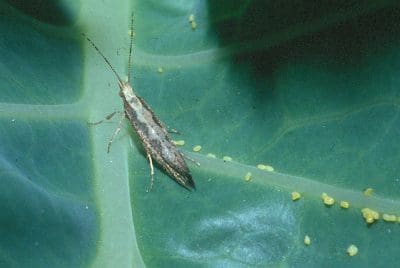CANOLA growers throughout the southern cropping region are advised to keep an eye out for diamondback moth (DBM), especially if conditions over the coming weeks are dry and temperatures are above average.
 South Australian Research and Development Institute (SARDI) entomologist, Greg Baker, said growers should monitor crops using a sweep-net at fortnightly intervals throughout flowering to windrowing/harvest.
South Australian Research and Development Institute (SARDI) entomologist, Greg Baker, said growers should monitor crops using a sweep-net at fortnightly intervals throughout flowering to windrowing/harvest.
Mr Baker said sweep-netting at the first sign of damage, and at intervals throughout the growing season from mid-July through to late spring, was recommended.
“Effective sweep-net monitoring involves taking a minimum of five sets of 10 sweeps in several representative parts of the crop and calculating the average number of the larvae, or caterpillars, per 10 sweeps,” Mr Baker said.
“Record the number of DBM larvae, the numbers of larvae of other moth pests and the numbers of DBM natural enemies. Trends in these regular counts can be a good predictor of the effectiveness of natural enemies and/or the imminent need to spray.”
University of Melbourne entomologist, Paul Umina, said monitoring DBM populations was an important aspect of an overall integrated pest management strategy which could reduce the risk of DBM developing resistance to available chemistries.
“Knowing what levels of infestation growers have in their canola crops will help them determine whether they need to spray. If DBM economic threshold levels aren’t reached, refraining from spraying is advised,” Dr Umina said.
DBM has a high propensity to develop resistance and there are more than 80 insecticide compounds recorded globally to which DBM has developed resistance.
Because of the high dispersal capacity of DBM moths, resistant individuals can soon dominate a landscape if there is widespread use of the same insecticide group.
SARDI screening of DBM in canola and vegetable production regions indicates that resistance to pyrethroids and organophosphates is widespread; low to moderate levels of resistance to avermectins is also common.
Mr Baker and Dr Umina were involved in development of the Grains Research and Development Corporation’s (GRDC) new Resistance Management Strategy for Diamondback Moth in Australian Canola, which aims to minimise the selection pressure for resistance to the same chemical groups across consecutive generations of DBM.
The strategy was developed by the National Insecticide Resistance Management working group of the Grains Pest Advisory Committee, and endorsed by CropLife Australia.
The strategy details economic thresholds and includes practical advice, such as:
- Where possible, avoid the use of pyrethroids and organophosphates for control of spring pests, and instead use target-specific ‘soft chemicals’;
- Ensure the target pest is correctly identified to ensure the most effective insecticide and rate is used. Misidentification and incorrect insecticide selection results in poor control and contributes to selection for resistance;
- Do not re-spray a crop in the same season where a known spray failure has occurred using the same product or another product from the same insecticide group, or if a spray failure has occurred where the cause has not been identified;
- If respraying is necessary, avoid using a chemical in the same group, in the same season;
- If a spray failure has occurred where the cause has not been identified, arrange for a DBM sample to be tested by SARDI for resistance to the product used;
- Comply with all directions for use on product labels;
- Ensure spray rigs are properly calibrated and sprays achieve good coverage, particularly in crops with a bulky canopy.
Source: GRDC
Note: In its revised 2017/18 canola crop report out this week, the Australian Oilseeds Federation made mention of DBM populations in crops in the Esperance zone of Western Australia.

HAVE YOUR SAY